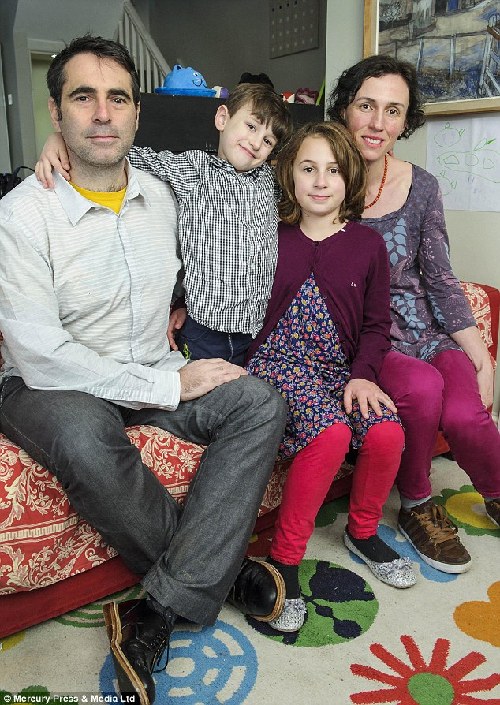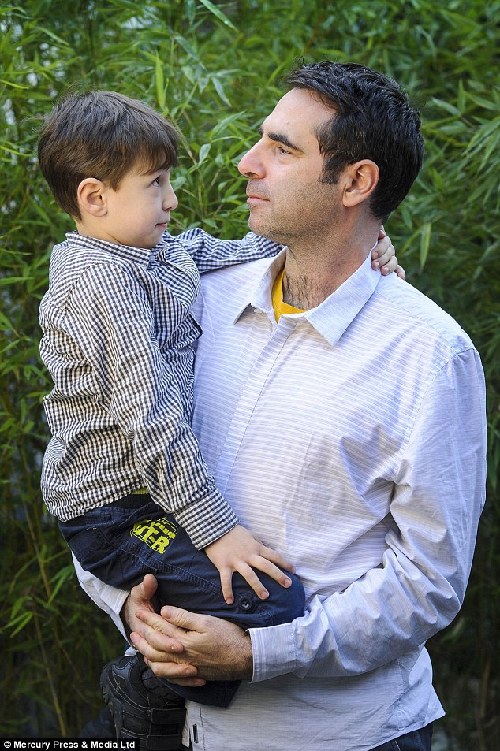Daniel Devlin lives in the same house as his children and sees them every day – yet he is unable to recognise them at all.
丹尼爾?德夫林(Daniel Devlin)與他的孩子們生活在同一屋檐下,天天見(jiàn)面,然而,丹尼爾卻認(rèn)不出自己的孩子。
Mr Devlin, 46, from Nunhead, London, is living with a bizarre condition called prosopagnosia, also known as face-blindness, meaning he struggles to recognise faces - even those of his own family.
來(lái)自倫敦南海德(Nunhead),今年46歲的德夫林先生患有一種奇怪的病癥,叫做人面失認(rèn)癥(prosopagnosia),又稱(chēng)臉盲癥。得了這種病也就意味著他有臉部識(shí)別障礙,即使是自己家人的面孔也辨認(rèn)不出。
Mr Devlin, a painter, has been forced to memorise his family's voices and body language in order to know who they are.
德夫林先生是一名畫(huà)家,他不得不靠記憶家人的聲音和肢體語(yǔ)言來(lái)分辨他們誰(shuí)是誰(shuí)。
But reading voices and body language doesn't always work, and has even mistaken another boy for his son when picking his children up from school before.
但是通過(guò)聲音和肢體語(yǔ)言來(lái)分辨也不是次次奏效的,他曾經(jīng)在去學(xué)校接孩子時(shí)把別的小男孩誤認(rèn)成自己的兒子。

Mr Devlin said: 'Humans have a special ability to recognise people by seeing their faces, I really don't have this ability.
德夫林先生說(shuō):“人類(lèi)有一種通過(guò)看臉來(lái)辨認(rèn)出他人的特殊能力,但是我卻沒(méi)有這種能力。”
'Maybe a good way to imagine what it's like to have prosopagnosia is to try and recognise people by what their hands look like.
“試試通過(guò)看手來(lái)認(rèn)人,這可能是了解得了人面失認(rèn)癥的人是什么感覺(jué)的好辦法,”
'Every person has a different hand but if someone showed you a photo of someone's hands, you might struggle to recognise who the person is, even if that person turns out to be someone you know very well.
“每個(gè)人的手都是不同的,但是如果有人給你看一張某個(gè)人的手部照片,你可能無(wú)法輕易分辨出那個(gè)人是誰(shuí),即便那是你熟知的人。”
?'I just thought that everyone was the same or maybe I just wasn't putting in as much effort as others to remember people.
“我本以為大家都是這樣的,也或許只是我沒(méi)有跟別人一樣花費(fèi)很多精力去記住別人的長(zhǎng)相而已。”
'If I saw my wife Katarina somewhere unexpected and she pretended not to know me, then I'm not sure I would know it was her.
“如果我在某地與我的妻子卡塔林娜不期而遇,而她假裝不認(rèn)識(shí)我,我不能確信自己可以認(rèn)出那是她。”
'It often leaves me in some awkward situations, especially when I don't recognise people that I should or think I know people that I don't.
“這使我常常陷入尷尬的境地,尤其是當(dāng)我認(rèn)不出那些我應(yīng)該認(rèn)識(shí)的人或以為自己認(rèn)識(shí)對(duì)方但其實(shí)并不認(rèn)識(shí)的時(shí)候。”

'I have learnt to recognise people based on their body language and voices instead.'
“我已經(jīng)學(xué)會(huì)了通過(guò)肢體語(yǔ)言和聲音來(lái)認(rèn)人。”
Experts said propagnosia is not linked to problems with vision, memory or intelligence.
專(zhuān)家稱(chēng)人面失認(rèn)癥與視覺(jué),記憶或者智力問(wèn)題無(wú)關(guān)。
Instead, it is thought to be the result of impairment in the right 'fusiform gyrus' of the brain - a fold that appears to coordinate facial perception and memory.
相反,專(zhuān)家認(rèn)為這是大腦右側(cè)梭狀回(fusiform gyrus)受損的結(jié)果,這部分腦回可能有協(xié)調(diào)面部認(rèn)知和記憶力的作用。
This could be as a result of a stroke, traumatic brain injury, or some neurodegenerative diseases.
中風(fēng),創(chuàng)傷性腦損傷或者某些神經(jīng)變性疾病都可能造成右側(cè)梭狀回受損。
Or, in cases such as Mr Devlin's - the condition is present at birth, and the pathways in the brain responsible for recognition never developed properly.
或者,同德芙林先生的情況一樣——臉盲癥是先天性的,大腦中負(fù)責(zé)識(shí)別的通路沒(méi)有正常發(fā)育。
Though he now knows he has had the had the condition all his life, Mr Devlin was only diagnosed in the last few years, through sheer chance.
雖然他現(xiàn)在知道了這一癥狀將伴隨他一生,但是德夫林先生是前幾年才偶然被確診的。
He said: 'I heard a programme about it on the radio and realised that's what I had.
他說(shuō):“我在廣播里聽(tīng)到了一期關(guān)于臉盲癥的節(jié)目,意識(shí)到自己得了這種病。”
Test confirmed he was suffering from face-blindness.
檢測(cè)結(jié)果證明他確實(shí)得了臉盲癥。
It is thought the condition affects up to one in 50 people, the equivalent of about 1.5 million people in the UK.
有人認(rèn)為至少每50人中就有一人患臉盲癥,相當(dāng)于在英國(guó)人當(dāng)中有150萬(wàn)的人有臉盲癥。
Some people with prosopagnosia may only struggle to recognise a familiar face, but in more severe cases sufferers cannot distinguish a face as being different from an object.
一些人面失認(rèn)癥患者可能只是在識(shí)別熟悉的面孔時(shí)有些困難,但情況更嚴(yán)重的人可能無(wú)法分辨出臉與其他物體的差別。
Some sufferers are unable to recognise their own faces.
有些患者甚至無(wú)法認(rèn)出自己的臉。
Vocabulary
bizarre: 怪異的
prosopagnosia: 人面失認(rèn)癥
awkward: 尷尬的
impairment: 損傷
fusiform gyrus: 梭狀回
traumatic: 創(chuàng)傷的
neurodegenerative: 神經(jīng)變性的
pathway: 通路
diagnose: 診斷
(譯者:旋轉(zhuǎn)木馬0930 編輯:劉明)
